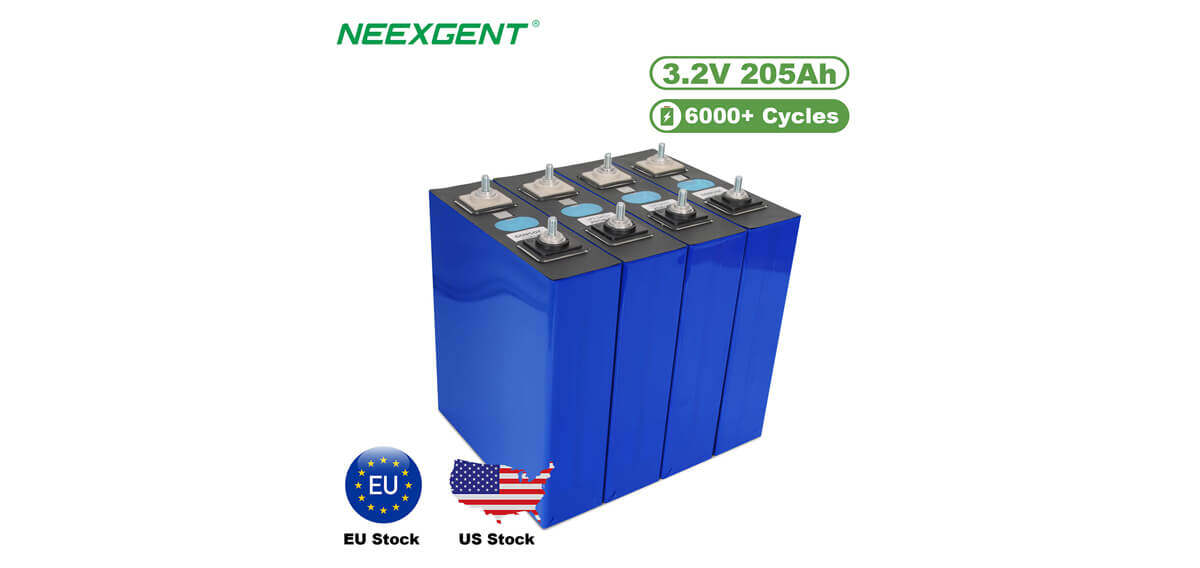With the rapid growth of electric vehicles (EVs) in recent years, the demand for high-performance and reliable battery technology has skyrocketed. Among the various lithium-ion battery options available, LiFePO4 (Lithium Iron Phosphate) battery cells have gained significant attention. In this article, we will delve into the world of LiFePO4 battery cells and highlight their advantages for electric vehicles, while also discussing their longevity, applications in renewable energy systems, safety features, and cost-effectiveness.

Neexgent 205ah Lithium Ion Pack Deep Cycle Lifepo4 Battery Cells
1: Enhanced Performance for Electric Vehicles
LiFePO4 battery cells offer several performance advantages that make them well-suited for electric vehicles. They have a high energy density, allowing them to store more energy within a smaller and lighter package. This translates to increased range and improved vehicle efficiency. Furthermore, LiFePO4 cells have a low self-discharge rate, meaning they retain their charge for longer periods, reducing the energy loss during storage or idle periods. This makes LiFePO4 battery cells highly reliable for EV applications.
2: Longevity and High Cycle Life
The longevity of LiFePO4 battery cells is a remarkable characteristic that sets them apart from other lithium-ion battery chemistries. LiFePO4 cells can endure a significantly higher number of charge-discharge cycles, typically exceeding 2000 cycles with proper management and care. This extended cycle life makes them ideal for EVs, as they can withstand daily charging and discharging without compromising performance, thereby offering a longer overall lifespan.
3: Versatile Applications in Renewable Energy Systems
Beyond electric vehicles, LiFePO4 battery cells find extensive use in renewable energy systems. Their ability to store and discharge energy reliably makes them an excellent choice for residential and commercial energy storage solutions. LiFePO4 batteries can store excess energy generated by solar panels or wind turbines, ensuring a stable power supply even during intermittent renewable energy generation. This versatility positions LiFePO4 battery cells as a key enabler for a greener and more sustainable future.
4: Robust Safety Features
Safety is a paramount concern when it comes to battery technology, especially for high-energy applications like EVs. LiFePO4 battery cells have inherent safety features that contribute to their reliability and reduced risk of accidents. They exhibit excellent thermal stability, meaning they are less prone to thermal runaway or overheating, even under extreme conditions. Additionally, LiFePO4 chemistry has a lower risk of explosion or fire when compared to other lithium-ion chemistries, making them a safer choice for electric vehicle applications.
5: Cost-effectiveness and Environmental Friendliness
LiFePO4 battery cells offer an attractive cost-to-performance ratio. Although they may have a slightly higher initial cost compared to other lithium-ion chemistries, their extended lifespan and high cycle life compensate for the upfront investment over the long term. Moreover, LiFePO4 batteries are environmentally friendly, as they do not contain toxic metals like cadmium or lead. Their production and disposal have a minimal impact on the environment, aligning with the sustainable ethos of the electric vehicle and renewable energy industries.
LiFePO4 battery cells have emerged as a preferred choice for electric vehicles and renewable energy systems, owing to their enhanced performance, longevity, versatile applications, robust safety features, and cost-effectiveness. These advantages make them an ideal option for powering the transportation sector's electrification and accelerating the global transition to clean energy. As technology continues to evolve, LiFePO4 battery cells are expected to play a significant role in shaping the future of sustainable energy storage and transportation.
LiFePO4 battery cells have proven themselves to be a promising technology in the realm of energy storage. Their numerous advantages, such as enhanced performance, longevity, versatile applications, robust safety features, and cost-effectiveness, make them a preferred choice for electric vehicles and renewable energy systems alike.
As the demand for electric vehicles continues to rise, the need for reliable and high-performance battery technology becomes increasingly crucial. LiFePO4 battery cells offer an excellent solution with their high energy density, low self-discharge rate, and long cycle life. Electric vehicles powered by LiFePO4 cells can travel longer distances, improve overall efficiency, and provide a more satisfying driving experience.
The applications of LiFePO4 battery cells extend beyond electric vehicles. They are widely used in renewable energy systems, enabling the efficient storage and utilization of solar and wind power. The ability of LiFePO4 cells to handle high charge-discharge cycles makes them a reliable choice for residential and commercial energy storage solutions, ensuring a consistent power supply even during intermittent renewable energy generation.
Safety is a paramount concern when it comes to battery technology, particularly in electric vehicles. LiFePO4 battery cells exhibit excellent thermal stability and have a lower risk of explosion or fire compared to other lithium-ion chemistries. This inherent safety feature instills confidence in consumers and paves the way for wider adoption of electric vehicles.
From a financial standpoint, while LiFePO4 battery cells may have a slightly higher initial cost, their extended lifespan and high cycle life make them a cost-effective choice in the long run. The durability and reliability of LiFePO4 cells result in reduced maintenance and replacement costs over time, providing an attractive return on investment for electric vehicle owners and renewable energy system operators.
Moreover, the environmental benefits of LiFePO4 battery cells cannot be overstated. They do not contain toxic metals like cadmium or lead, making them a cleaner and more sustainable choice. The production and disposal of LiFePO4 cells have minimal environmental impact, aligning with the global efforts towards a greener future.
As technology continues to advance, LiFePO4 battery cells are expected to undergo further improvements, enhancing their performance, energy density, and cost-effectiveness. With ongoing research and development, we can anticipate even better energy storage solutions, enabling a seamless transition to a sustainable and low-carbon future.
LiFePO4 battery cells offer a compelling set of advantages for electric vehicles and renewable energy systems. Their enhanced performance, longevity, versatile applications, safety features, and cost-effectiveness position them as a frontrunner in the field of energy storage. With their inherent potential, LiFePO4 battery cells are poised to revolutionize the way we power our vehicles and harness renewable energy, driving us towards a cleaner, more sustainable future.






